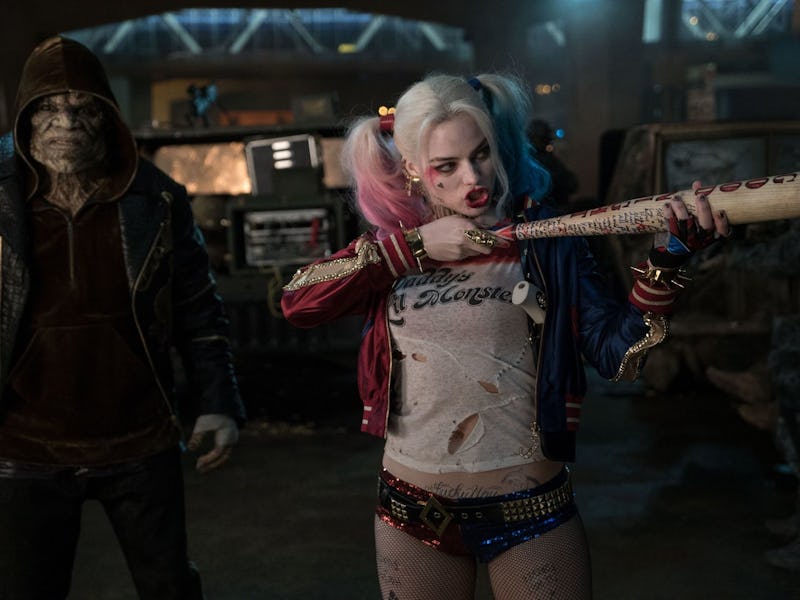Harley Quinn Is Clearly Crazy. Can America Root for an Insane Woman?
A trip down memory lane to see how Harley Quinn compares to madwomen past.

When Suicide Squad drops in August, it’s going to deliver a new kind of heroine at its center. Margot Robbie’s Harley Quinn isn’t just Luna Lovegood-style adorably eccentric, or Arya Stark-style violent yet mostly justified, or even Ilana Glazer-style zany: She’s full on cuckoo and just as murderously psychotic as her dysfunctional love, the Joker. American audiences quietly hold a psycho double-standard: We embrace male psychopaths like its our job, peppering TV with sexy serial killers. But lady psychos get saddled with stigmas — writers and the public at large tend to favor predictable women characters.
To determine if America is truly ready to embrace a certifiable heroine, let’s take a look at madwomen past.
1950s: Blanche DuBois, A Streetcar Named Desire
As played by Vivien Leigh, Blanche DuBois is the original fragile madwoman. She’s far less violent than Harley Quinn, but she captivated audiences with her tragic vulnerability, delusions of grandeur, and complicated relationship with an uncompromising man — all things Harley can certainly relate to.
1960s: Cruella de Vil, One Hundred and One Dalmatians
Cruella de Vil has Harley Quinn’s strut but little of her charm. Quinn might dance with human corpses, but de Vil victimizes puppies. There’s no embracing that.
1970s: Nurse Ratched, One Flew Over the Cuckoo’s Nest
Like Harley Quinn, Nurse Ratched presides over a mental institution — and like Harley Quinn, it slowly becomes an instance of the inmates running the asylum. With her rigid authoritarian mien, however, Ratched has none of Harley’s charm and humor. Needless to say, she’s an infamous villain, but she’s not exactly a character to root for. Louise Fletcher, who played Ratched, won the Best Actress Oscar in ’75 for the role. She took the role after it was turned down by the likes of Anne Bancroft, Angela Lansbury, Geraldine Page, Colleen Dewhurst, and Ellen Burstyn — because, in the words of The New York Times, “they thought the character was too grotesque a monster.” Unlike most villains, she’s not full of evil laughter and loopy mutterings. Her insanity simmers beneath her rigid control, which is somehow even scarier — she’s so nuts, she thinks she’s on the side of the good. Her pop culture footprint is deep, and if there’s a single soul who finds her “likable,” perhaps they’re in need of a lobotomy.
1980s: Veronica Sawyer, Heathers
Veronica Sawyer might be Harley’s closest spiritual sister. She begins as deceptively normal, but after she falls in with the wrong crowd and ends up in an unbelievably destructive relationship with a unhinged guy, her sanity flies out the window. Even at her meanest, her speech is peppered with irreverent one-liners.
1990s to early 2000s: Drusilla, Buffy the Vampire Slayer
Here we turn to television, in the moment when cinematic TV began to overthrow movies. The poor mad vampire Drusilla on Joss Whedon’s iconic Buffy the Vampire Slayer was corrupted by a sadistic man — just like Harley — but morphed into her own psychotic creation. Also like Harley, she comes across as loony and harmlessly dumb, causing people to underestimate her.
2010s: Cersei Lannister, Game of Thrones
The madwoman of our moment is Game of Thrones’ Cersei. Like Harley, she’s vicious, has questionable romantic relations, and is smarter than she seems. America hasn’t exactly embraced her per se, but the world accepts her as a character to love to hate.
Harley will be in good company as pop culture’s latest nutcase. She’s got Blanche DuBois’ hidden tragedy, Cruella de Vil’s flair, Nurse Ratched’s asylum experience, Veronica Sawyer’s sense of anarchy, Drusilla’s sinister playfulness, and Cersei’s biting love of a good time. But she’s also very much her own character. When Suicide Squad hits, it will be the ultimate test. Forget the age of the downtrodden male antihero like Walter White, Don Draper, or Richie Finestra; they’re old news. The age of the unhinged antiheroine is about stride in, popping gum and swinging a baseball bat.